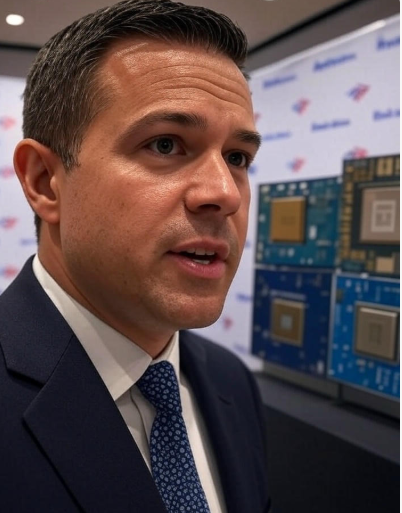On April 22, 2025, BMW made headlines at the Shanghai Auto Show when CEO Oliver Zipse announced that the German automaker would integrate artificial intelligence from Chinese startup DeepSeek into its new vehicles in China starting later this year. This move marks a significant step in BMW’s strategy to enhance in-car intelligence and user experience for Chinese consumers, reflecting a broader trend of global automakers partnering with regional tech firms to stay competitive in the world’s largest automotive market. With DeepSeek’s AI already making waves across industries in China, BMW’s adoption of this technology promises to redefine the driving experience, blending luxury with cutting-edge innovation. Let’s explore what this integration means for BMW, the Chinese market, and the future of automotive AI.
DeepSeek: A Rising Star in AI Innovation
DeepSeek, a Hangzhou-based startup, has rapidly emerged as a powerhouse in the AI landscape since the release of its R1 reasoning model in January 2025. The company, backed by its parent firm High-Flyer—a successful Chinese quant fund—has disrupted the global tech industry by offering AI models that rival Western counterparts like OpenAI and Anthropic, but at a fraction of the cost. DeepSeek’s R1 model made headlines for triggering a $1 trillion-plus sell-off in global equities markets, underscoring its impact on the tech world. The company followed up with the V3 large language model in March 2025, further enhancing its capabilities in reasoning, coding, and multilingual processing.
What sets DeepSeek apart is its focus on practical applications and efficiency. Unlike traditional AI models that require massive computational resources, DeepSeek employs a Mixture of Experts architecture, using specialized smaller models that collaborate to reduce power consumption while maintaining high performance. This approach is particularly well-suited for automotive applications, where processing power is often a limiting factor. DeepSeek’s ability to understand contextual nuances, recognize regional dialects, and facilitate multi-turn conversations makes it an ideal choice for enhancing in-car human-machine interaction.
DeepSeek’s success is also a point of national pride in China. Local media have hailed CEO Liang Wenfeng as the “AI hero of Guangdong,” and the company’s collaborative, research-driven culture—eschewing the rigid hierarchies typical of Chinese tech giants—has attracted top talent. With Chinese automakers like Geely, BYD, and Great Wall already integrating DeepSeek’s AI into their vehicles, BMW’s decision to follow suit positions it at the forefront of this technological wave.
BMW’s Strategic Move in China
China is a critical market for BMW, accounting for 16.1% of its net sales in 2023, according to MarketScreener. The country’s tech-savvy consumers and rapid adoption of electric vehicles (EVs) have pushed global automakers to innovate quickly to meet local demands. BMW has already shown its commitment to this market through partnerships like its collaboration with Alibaba to integrate the Qwen-powered Yan AI into its Neue Klasse models starting in 2026. However, the integration of DeepSeek’s AI later this year signals a more immediate push to enhance its vehicles’ technological capabilities.
Oliver Zipse emphasized the importance of China in AI innovation, stating, “Key advances in AI are happening here. We are strengthening AI partnerships for integration in our vehicles in China.” This partnership with DeepSeek aligns with BMW’s broader AI strategy in China, which includes leveraging AI for joint coding, defect detection, voice-based testing, and contextual control development. By adopting DeepSeek’s technology, BMW aims to enhance its Intelligent Personal Assistant (IPA), offering a more intuitive and human-like interaction for drivers.
The specifics of the integration remain under wraps, but industry speculation suggests that DeepSeek’s AI could enhance several aspects of BMW’s vehicles, including voice control, driver assistance systems, and smart cockpit features. For example, Chinese automaker Geely has used DeepSeek to enable its vehicles to understand vague instructions like “I’m a bit tired,” prompting the car to adjust the seat, dim the lights, and set a nap timer. BMW could implement similar features, tailoring the driving experience to the needs and preferences of Chinese consumers.
Enhancing the Driving Experience
One of the most exciting prospects of this integration is the potential for a more seamless and personalized driving experience. DeepSeek’s advanced natural language processing capabilities allow it to understand contextual nuances and regional dialects, which is crucial in a diverse market like China. For BMW drivers, this could mean a voice assistant that not only responds to commands but also anticipates needs, making interactions more natural and fluid.
Imagine a BMW driver in Shanghai saying, “I’m running late for my meeting.” With DeepSeek’s AI, the car could respond by suggesting the fastest route, adjusting the climate control to keep the driver comfortable, and even sending a message to the meeting attendees to inform them of the delay—all without additional input. This level of contextual awareness could set BMW apart in a market where competitors like Geely and BYD are also racing to integrate AI into their vehicles.
DeepSeek’s efficiency is another key advantage. Its Mixture of Experts architecture allows for faster inference speeds—up to 50 times faster than traditional AI models—making it ideal for real-time applications like autonomous driving and driver assistance. While BMW has not specified whether DeepSeek’s AI will be used for autonomous driving, the technology’s ability to reduce computational costs could improve decision-making efficiency, paving the way for more advanced features in future models.
Challenges and Opportunities
While the integration of DeepSeek’s AI offers significant opportunities, it also comes with challenges. One concern is the depth of integration. As noted in a CTOL Digital Solutions report, many automakers’ AI implementations remain superficial, relying on API-level integration rather than full-stack customization. If BMW simply deploys DeepSeek’s AI as a generic voice assistant, it risks losing differentiation in a crowded market. To truly stand out, BMW must leverage DeepSeek’s capabilities to create unique, luxury-focused features that align with its brand identity.
Another challenge is the potential for overreliance on DeepSeek’s technology. As Rest of World reported, some Chinese officials have warned about the risks of over-dependence on a single AI provider, especially as DeepSeek becomes embedded in everything from cars to government services. BMW will need to balance its partnership with DeepSeek while maintaining flexibility to integrate other AI models, such as Alibaba’s Qwen or Baidu’s ERNIE, as the technology evolves.
On the opportunity side, this partnership positions BMW to capitalize on China’s growing EV market. With fully electric vehicles accounting for over 17% of BMW’s total sales in 2024, and the company targeting further growth in 2025, the integration of DeepSeek’s AI could make BMW’s EVs more attractive to tech-savvy Chinese consumers. As Grace Shao, founder of AI-industry newsletter AI Proem, noted, “Chinese EV market leaders have all their ducks in a row, and now DeepSeek is accessible to them, perfectly positioning them to excel.” BMW’s adoption of DeepSeek’s AI could help it compete with local EV giants like BYD, which has also integrated DeepSeek into its vehicles.
The Broader Implications for the Automotive Industry
BMW’s partnership with DeepSeek reflects a broader shift in the automotive industry toward AI-driven value creation. Historically, automaker valuations have been tied to hardware metrics like EV penetration rates and production volume. However, the rise of AI integration suggests a transition toward valuing companies based on their intelligent system capabilities. This shift could have profound implications for supply chain dynamics, as automakers increasingly prioritize software and AI over traditional hardware components like LiDAR sensors.
The partnership also highlights the growing importance of China-Europe collaboration in the tech and automotive sectors. As Jian Junbo, director of the Center for China-Europe Relations at Fudan University, noted, “This type of cooperation highlights the potential for openness, mutual benefit, and win-win outcomes between Chinese and European firms.” BMW’s willingness to partner with Chinese tech firms like DeepSeek and Alibaba underscores the complementary advantages of both sides: China’s leadership in AI innovation and BMW’s expertise in luxury vehicle manufacturing.
Looking Ahead
As BMW prepares to roll out DeepSeek’s AI in its new vehicles later this year, the automotive world will be watching closely. This integration has the potential to redefine the driving experience in China, offering a glimpse into the future of AI-driven mobility. For BMW, it’s a chance to strengthen its position in a key market while pushing the boundaries of what a luxury vehicle can offer. For DeepSeek, it’s another milestone in its rapid ascent as a global AI leader.
The success of this partnership will depend on BMW’s ability to leverage DeepSeek’s technology to create a truly differentiated driving experience. If done right, it could set a new standard for in-car intelligence, blending the best of German engineering with Chinese innovation. As the lines between automotive and tech industries continue to blur, BMW’s collaboration with DeepSeek is a bold step toward the future—one where AI doesn’t just enhance the drive, but transforms it entirely.
Sources: Reuters, April 22, 2025; Rest of World, March 13, 2025; CTOL Digital Solutions, February 11, 2025; Global Times, March 25, 2025.



